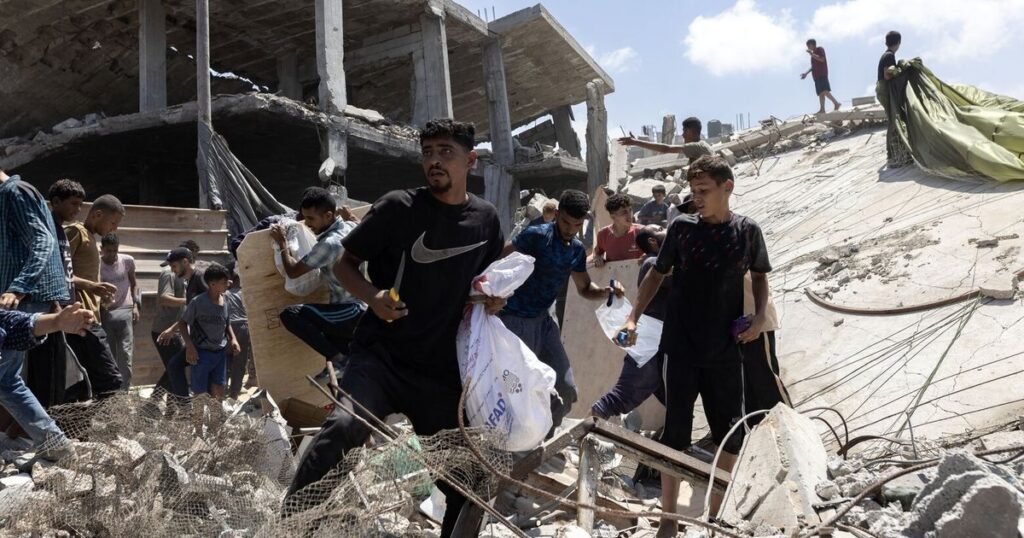TEL AVIV, Israel — When Israel’s security Cabinet ministers voted early Friday to approve a risky plan to take control of a war-torn Gaza City, objections flowed in from key international allies.
But criticism had also notably come from the highest levels of Israel’s own military — the same military that is expected to carry out the Cabinet directive.
Earlier this week, the military’s chief of staff, Lt. Gen. Eyal Zamir, objected to expanding the war in the Gaza Strip, according to four Israeli security officials who spoke on the condition of anonymity to discuss sensitive issues. Zamir raised questions about the exhaustion and fitness of reservists after a grinding, nearly two-year war in the enclave.
Israeli military leadership has said that it prefers a new ceasefire instead of renewed fighting, according to three of the officials. Now one of the last commanders of Israeli forces in Gaza before Israel withdrew troops from the territory in 2005 is throwing cold water on the plan to widen operations in Gaza.
“This won’t bring back the hostages, and it won’t lead to the defeat of Hamas or make it give up its weapons,” Gadi Shamni, a retired major general, said in a telephone interview Friday.
“What will this do?” he added. “It will create more bereaved families, it will harm Israel’s standing in the world, it will undermine the economy, and it will deepen the crisis of trust between the government and the military.”
Israeli troops have already conquered about 75% of Gaza. The coastal strip stretching from Gaza City in the north to Khan Younis in the south is the main area outside Israeli control.
Israeli Prime Minister Benjamin Netanyahu said in an interview on Fox News on Thursday that Israel intended to take control of all of Gaza. But in a statement Friday morning, his office stopped short of saying Israel would conquer the entire territory, instead saying the military will prepare to take over Gaza City. The different statements left the government’s ultimate intentions ambiguous.
Netanyahu said in the Fox interview that a takeover would “assure our security,” remove Hamas from power and enable the transfer of the civilian administration of Gaza to another party. But he suggested Israel was not interested in maintaining permanent control over all of Gaza.
Some analysts have said that amid stalled ceasefire negotiations, he may be trying to use the threat of a new Israeli operation as a way to extract concessions from Hamas, which led the deadly Oct. 7, 2023, attack on southern Israel.
Shamni said that another raid on Gaza City would not bring about a fundamental change to Hamas’ power in Gaza or its position in ceasefire negotiations.
And if Israel planned to take over the city before a potential long-term occupation of Gaza, he said, it would take years before the military managed to set up a functioning military government and to degrade Hamas enough to stabilize the situation.
“The state of Israel doesn’t even have the resources for such a thing,” he added. “Where will Israel get all of the money for this?”
Since the start of the war, Israeli troops have raided Gaza City several times. But each time, Hamas has succeeded in regrouping in neighborhoods where Israeli soldiers had conducted operations.
During the attack in October 2023, about 250 people were taken hostage to Gaza, and more than three dozen hostages have been killed while in captivity, according to an investigation by The New York Times. Up to 20 living hostages are believed to still be in the territory, along with the remains of 30 others, according to Israeli authorities.
American and Israeli officials have suggested an all-or-nothing deal under which Hamas would have to release the remaining hostages in exchange for Palestinian prisoners and agree to terms to end the war that include the group’s disarmament.
Despite objections from long-standing European allies Friday, Israel has shown no sign of backing down from carrying out a new Gaza operation.
“The Israeli government’s decision to further escalate its offensive in Gaza is wrong, and we urge it to reconsider immediately,” Prime Minister Keir Starmer of Britain said. And Germany said that until further notice, it would halt exports of military equipment to Israel that could be used in Gaza.
The U.N. Security Council scheduled meetings for this weekend to discuss the situation in the Middle East.
It is likely to take days for the Israel military to gather up reserve forces, carry out troop deployments and allow time for the forced evacuation of Palestinians huddled in apartments, tents and makeshift shelters.
For the Israeli military, the government’s decision to escalate the war is particularly concerning because it could risk the lives of hostages, Israeli officials said.
“Until today, there was a debate if military pressure will or will not bring back hostages,” Shamni said. “Now it’s totally clear that military pressure not only doesn’t bring back hostages; it will kill them.”

